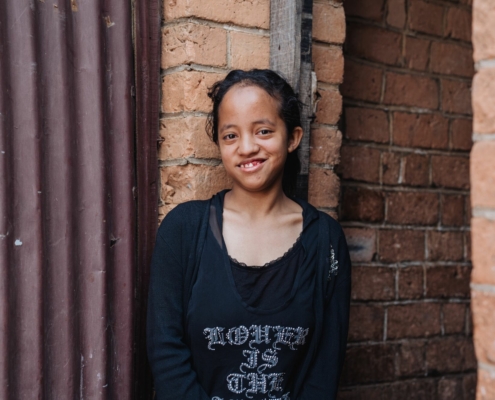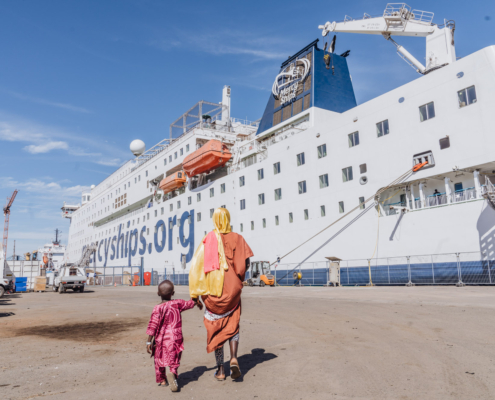Powerful call to action: Collaborate now to bridge critical global surgical care and education gap
Mercy Ships and Operation Smile Co-Host Side Event at 77th World Health Assembly

GENEVA, SWITZERLAND – MAY 30, 2024: The imperative need for collaboration to tackle critical gaps in surgical care and education around the globe gained fresh recognition at a high-level panel discussion during the 77th World Health Assembly. (WHA).
This side event on May 30th highlighted the synergies between surgeons, policy makers, NGOs, academia and the private sector. The WHA’s main theme for the 77th assembly was ‘All for Health, Health for All’.
International charity Mercy Ships and fellow NGO, Operation Smile, partnered to organize a side event during the WHA in Geneva, Switzerland. The event, titled “Amplifying Synergies Between NGOs, Multilaterals, and Academia to benefit Surgical Patients,” took place on May 30th at the Hotel Beau-Rivage.
The side event panel discussion, which included speakers from universities and teaching hospitals from Zambia, Rwanda, South Africa and Peru, discussed how over 100 million additional surgical procedures are needed in low- and middle-income countries (LMICs) each year to save lives and prevent disability.
Mercy Ships’ International Chief Medical Officer Dr Mark Shrime started the panel discussion by explaining that it was incumbent on people within NGOs, multilaterals and academia to break down the walls between them for the sake of the neglected surgical patients around the globe.
Dr. Wieslawa de Pawlikowski, a pediatric reconstructive microsurgeon and Director of International Cooperation Ministry of Health Lima, Peru said: “With the government sector, we can find the formula to give access to timely and quality surgical care to the population within and across our regions.”
Dr. Faustin Ntirenganya, President of the Rwanda Surgical Society and Consultant General & Onco-Plastic and Breast Surgeon at the University Teaching Hospital of Kigali, Rwanda said: “We have been talking about global surgery for quite long… I think we should stop talking about it and actually start doing it.”

Representatives from each nation spoke of alarming gaps in equitable access and quality of care and how they had only made limited progress. Dr. Ruben Ayala, Operation Smile Chief Policy and Advocacy Officer, moderated the discussion which was a landmark partner event for both NGOs.
Dr. Teri Reynolds, WHO’s Head of Clinical Services and Systems highlighted how 10 years from the Lancet Commission on Global Surgery called for action to help those in need but said it was far harder than it would have been before 2020.
She said: “We’ve come out of the COVID period with a surgical backlog that we will never overcome in our lifetimes unless we do something entirely different.” She added the pandemic had made the global challenge to tackle surgical gaps far worse as the narrative had shifted for how we protect ourselves from the next infective threat.
On May 29, WHA leaders in the assembly decided that a new Global Strategy and Action Plan for Integrated Emergency, Critical, and Operational Care (ECO) for 2026-2035 will be developed. Dr. Reynolds said although this was great progress more needed to be done to ensure this success progresses.
Dr. Salome Maswime, an obstetrician and gynecologist and Head of the Global Surgery Division at the University of Cape Town, highlighted both the importance of investment in teaching and educating public health specialists and decision makers to understand surgical systems and teaching surgical leadership and health systems leadership for all working in health systems and policy makers.
Dr. Maswime said: “So you have to teach not only the surgeons, but you also have to teach the public health specialists. But my biggest area, I think, is leadership. You can’t outsource leadership. You can’t donate leadership. You can’t run leadership for another country. We can donate equipment. We can do surgeries and operate, but you cannot outsource leadership. And our leaders are often not trained or prepared to run health systems.
“Our leaders often have been taught anatomy, physiology, pathology, and all of this. And then you expect them to fix the nation’s problems.”
She said in their classes they have politicians learning about surgery and leading systems.
She added: “And we feel that in that way, you start to change the next generation and change how people think and how they work. And you give them capacity to make better decisions for the future.”
Dr. Emmanuel Makasa, Executive Director of the Wits SADC Regional Collaboration Centre for Surgical Healthcare (WitSSurg) which is a significant initiative aimed at improving surgical healthcare within the Southern Africa Development Community (SADC) stated: “There is a gap between political commitments and the translation of these commitments for patients.”
He said he believed policy is the only way to transform commitment into something that touches the patient.
Mercy Ships National and International Advocacy Manager Dr. Walt Johnson said: “If any of us want to get across the finish line by ourselves we will fail but all of us collectively can really synergize in amazing ways and can get across the finish line, maybe not in our lifetime, but eventually.”
Watch the discussion 77th WHA Side Event co-hosted by Mercy Ships & Operation Smile – YouTube
ENDS
ABOUT MERCY SHIPS:
Mercy Ships operates hospital ships that deliver free surgeries and other healthcare services to those with little access to safe medical care. An international faith-based organization, Mercy Ships has focused entirely on partnering with African nations for the past three decades. Working with in-country partners, Mercy Ships also provides training to local healthcare professionals and supports the construction of in-country medical infrastructure to leave a lasting impact.
Each year, more than 3,000 volunteer professionals from over 60 countries serve on board the world’s two largest non-governmental hospital ships, the Africa Mercy® and the Global Mercy™. Professionals such as surgeons, dentists, nurses, health trainers, cooks, and engineers dedicate their time and skills to accelerate access to safe surgical, obstetric and anesthetic care. Mercy Ships was founded in 1978 and has offices in 16 countries as well as an Africa Service Center in Dakar, Senegal. For more information, visit mercyships.org and follow @MercyShips on social media.
For more Information about Mercy Ships, contact:
Sophie Barnett
Mercy Ships International PR Manager
sophie.barnett@mercyships.org
About Operation Smile:
Operation Smile is a global nonprofit bridging the gap in access to essential surgeries and healthcare, starting with cleft surgery and comprehensive care. Operation Smile provides medical expertise, training, research and care through dedicated staff and medical and student volunteers around the world, working alongside local governments, nonprofits, and health systems.
For more Information about Operation Smile, contact:
Pedro Mucciolo
Operation Smile Senior Director, Global Communications
Pedro.mucciolo@operationsmile.org






